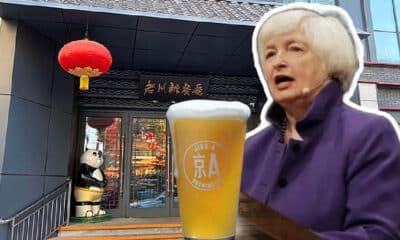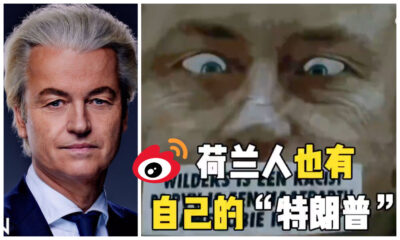China World
Frozen Europe and Fast-Changing China: Martin Jacques on the Sino-European Dilemma
Published
7 years agoon
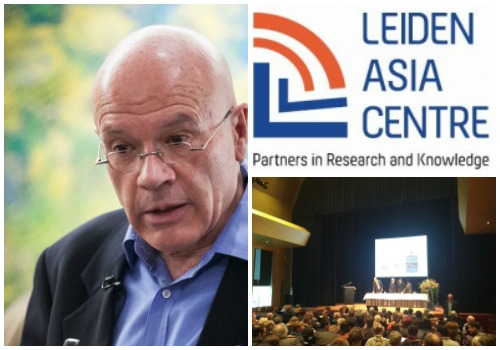
British journalist and scholar Martin Jacques speaks about current Sino-European relations as a keynote speaker at the opening conference of the Leiden Asia Centre. According to Jacques, the way Western media and politics are approaching China is deeply flawed – and it is causing Europe to miss the boat while China is marching forwards. Live blogged.
February 9th 2017 marks the much-anticipated opening conference of the Leiden Asia Centre, the expertise centre for socially relevant and applicable knowledge on modern East Asia based in the Netherlands.
The conference focuses on Sino-Dutch relations and the relations between Europe and China at large.
One of today’s key speakers is British journalist and scholar Martin Jacques (@martjacques), the author of the global best-seller When China Rules the World (2009). One of his key arguments is that China’s impact on the world goes beyond economics, and that it will also have extensive political, cultural and ideological consequences.
“China is looking for the ‘cracks’ in the global system; that where it is at its weakest.”
In introducing Martin Jacques, Professor Frank Pieke, one of the three academic directors of the Leiden Asia Centre, first talks about a separate “global China”, that is different from Western patterns of globalization.
China is looking for the “cracks” in the global system; that where it is at its weakest. Its presence is growing in Africa, Latin America, and also in regions like southern Europe. China is not looking for challenges, but it is looking for space, Pieke says.
One of the reasons why this is happening, Pieke argues, is that China is hamstrung by the fact that within its own region it is often perceived as a potentially hostile power by, for example, Japan or Korea. It does not have its own sphere of influence from where it can expand into the world.
“China is not ‘like us.’ It has never been and it will never be.”
Martin Jacques agrees with Pieke in the sense that “China’s globalization” is different from “globalization” as it is often perceived in the West.
There is a fundamental problem with how China is framed and discussed in western media, politics and academia, Jacques argues, as it often come down to the idea that China should be ‘like us.’
“We are the ‘global leaders’ and we supposedly define what modernity is, and modernity is singular. And therefore modernisation is westernization, and therefore China will end up just like us. Well, this is complete rubbish,” Jacques says: “China is not ‘like us.’ It has never been and it will never be.”
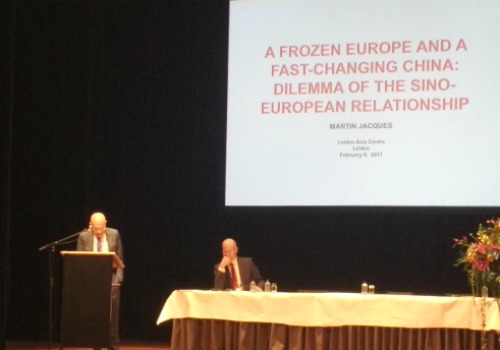
Jacques stresses that the concept of ‘modernity’ is plural, and that there is not one modernity because it is not shaped in neo-liberal terms, but it is shaped by history and culture. And since China’s history and culture is profoundly different from that of any Western country, we have to understand China in its own terms – not in our terms. The main reason why Western media or politics got China “so wrong” in the last decennia, Jacques argues, is because they failed to do this.
The assumptions people have about China are therefore generally flawed, and have failed to predict how China would evolve in the future.
China is not a nation state, but a ‘civilization-state’, and is very different from any European nation state. It is a huge united country – and the fact that it is stable and unified is the country’s top priority. The key political values of the Chinese are influenced by this idea, and also fundamentally different from Europe.
Why China is politically never going to be the same as Europe is because its key political concepts of unity, stability, and order, based on its long history, are what have shaped and are shaping China.
“China has not followed anyone’s route, but has chosen its own.”
China has not followed anyone’s route, but has chosen its own, Jacques argues. “The idea that Chinese governance is going to be like Western governance is profoundly mistaken. China is not going in that direction. I am not saying they will not change – there have been large changes already – but it will change in its own ways.”
China is historically also very different from Europe in the sense that it has not colonized the way Europe has, and has been less aggressive.
“Consider that China from being dirt poor is becoming the world’s second economy, and this all in a relatively peaceful process.”
Jacques emphasizes that China is in the process of transforming the world. Not only due to its size, but also due to its difference, that is bound to going to project itself and bring its history, values, and traditions to the rest of the world.
“China is not the leader of globalization, but it is certainly true to say that China is shaping globalization profoundly.”
All discourse about China’s rise has always been economic – discussed within the framework of American hegemony. But Jacques wants to stress that the rise of China goes much further than economics alone: 1.4 billion people are in the process of transformation is all sorts of ways, which is impacting China and the world in numerous ways.
Jacques notes that China has sometimes been blamed for being a ‘free rider’ in the international society, or for not ‘contributing’ anything, but this is changing. Since Xi Jinping has risen to power there have been some extraordinary initiatives, such as the Asian Infrastructure Investment Bank. Jacques predicts that also through these kinds of initiatives, its influence is growing, and that those ever said China is not ‘contributing’ will be biting their tongues.
“It is not true to say China is the leader of globalization, but it is certainly true to say that China is shaping globalization profoundly.”
Jacques is pessimistic about the prospect of Sino-European relations. China is going ahead, and Europe is basically “stuck”, as it is increasingly turned inwards.
“Tencent, Alibaba, Huawei, Baidu, JD.com, Xiaomi, and other tech companies show that in many ways China is now ahead of Silicon Valley.”
Lastly, Jacques addresses the importance of China as a global power and crucial global influencer in various ways.
China’s online growth has shown it is the global leader in terms of internet commerce. Tencent, Alibaba, Huawei, Baidu, JD.com, Xiaomi, and other tech companies show that in many ways China is now ahead of Silicon Valley, with China’s online sales being well ahead of those in countries like the USA. Jacques also mentions that the functionality of apps like Weixin/WeChat is more advanced than its western counterpart Whatsapp – meaning that ‘the world’ will also be looking at China when it comes to its digital developments.
The country is also moving quickly in other ways. China is also the leader when it comes to issues such as climate change and foreign investments. He also mentions the ‘One Belt, One Road’ project (“it’s probably going to be extremely important.”)
“If Europe can’t hitch a ride with China in its transformation, then it will become marginalized.”
There is one last thing Martin Jacques wants to add to his speech, and it is about Trump, whom he calls “the most frightening president the US has ever had”, and how he will change the EU-USA-China dynamics.
Under Trump, he said, America will look after its own interests and will interact with the rest of the world in terms of bilateral relationships rather than from a plural, global position.
What will the Chinese do? “They will retaliate,” Jacques says. As China-US relations deteriorate, with China pushing America back, they will deepen the agreements with their own neighbors. The One Belt, One Road is an important part of this strategy.
Jacques foresees that the rise of Trump will also change Sino-European relations, as Europe -like China- also has little interest in Trump.
“I started off by saying Europe and China are very different, which is true,” he says. But despite his somewhat pessimistic views on Sino-European relations that find its roots in the western frameworks applied to China, there is also some light at the end of the tunnel: “Unlike the USA, both Europe and China have a long history. And there has been little rivalry with China. There is a logic for Europe to move much closer to China.”
Jacques stresses the importance for Europe to keep up with China. It is not China that needs to change, he argues – Europe does.
“China will keep marching on. China will keep its dynamic transformation. It will continue to grow. China is not the problem. Europe is. And we need to face up to that. If we can’t hitch a ride with China in its transformation, then we will become marginalized.”
Liveblog ended
– By Manya Koetse
Follow on Twitter or Like on Facebook
What’s on Weibo is an independent blog. Want to donate? You can do so here.
[showad block=1]
©2017 Whatsonweibo. All rights reserved. Do not reproduce our content without permission – you can contact us at info@whatsonweibo.com
Manya Koetse is the founder and editor-in-chief of whatsonweibo.com. She is a writer, public speaker, and researcher (Sinologist, MPhil) on social trends, digital developments, and new media in an ever-changing China, with a focus on Chinese society, pop culture, and gender issues. She shares her love for hotpot on hotpotambassador.com. Contact at manya@whatsonweibo.com, or follow on Twitter.

China Food & Drinks
Where to Eat and Drink in Beijing: Yellen’s Picks
From Yunnan classics to fusion cuisine, these are Janet Yellen’s picks for dining and drinking in Beijing.
Published
2 weeks agoon
April 11, 2024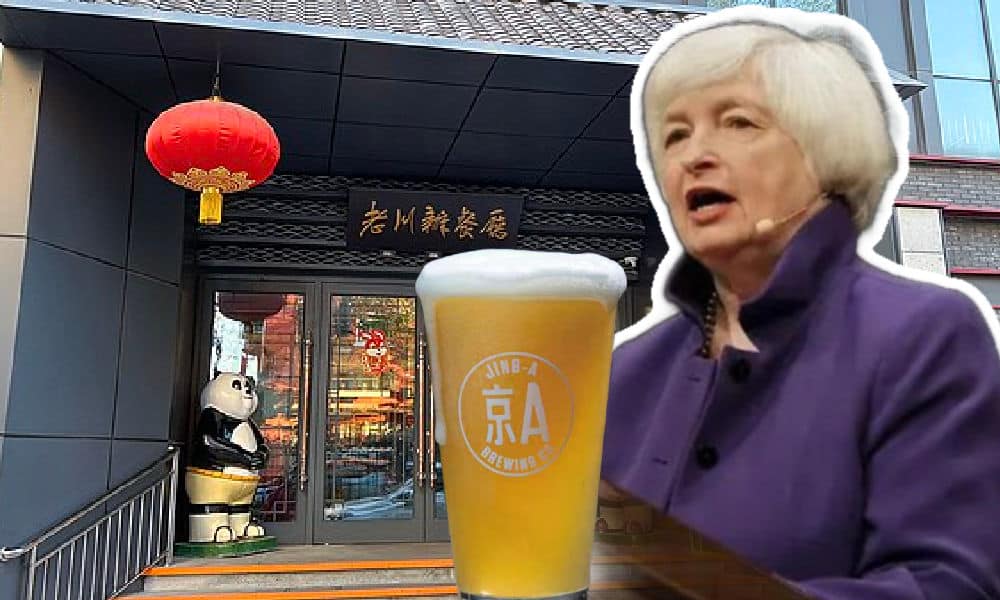
Janet Yellen, the United States Secretary of the Treasury, seems to have some excellent advisors, at least when it comes to choosing spots for food and drinks in Beijing.
Yellen just concluded her second trip to Beijing within a year, and once again, it’s not her official talks but rather her choices in food and drink venues that are sparking discussion on social media.
Her initial visit to Beijing was in July 2023, during which she held meetings with Chinese Premier Li Qiang and other officials.
This time, from April 4th to 9th, Yellen’s agenda included engagements with top Chinese officials in both Guangzhou and Beijing. The primary focus was on addressing ongoing bilateral tensions and managing trade relations between the US and China. In addition to official meetings, Yellen also met up with students and business leaders.
Yellen’s selection of bars and restaurants drew interest online. Yellen is known to be a food enthusiast, and likes to visit local restaurants wherever she goes.
In Guangzhou, Yellen dined at Taotaoju (陶陶居), a renowned Cantonese restaurant where she had roast goose and shrimp dumplings.
If you’re curious about the places she visited in Beijing during her first and second trip, check out our short ‘Yellen’s Beijing’ list below.
‘In & Out’ Yunnan Restaurant
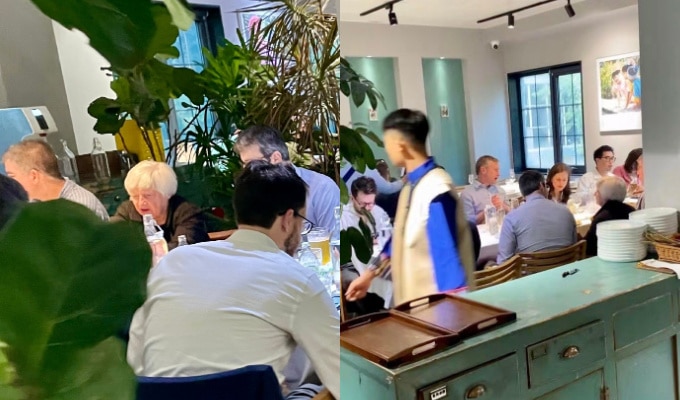
Yellen at Yizuo Yiwang, photos via Weibo.
● Name: ‘In and Out’ in English, Chinese name: Yī Zuò Yī Wàng 一坐一忘
● Specialty: Yunnan cuisine
● Notable: Yellen visited this local favorite near Beijing’s embassy area in the summer of 2023. Among other things, Yellen was served spicy potatoes with mint and stir-fried mushrooms, leading to online jokes about how the food would affect her. The mushroom dish that she had is called jiànshǒuqīng (见手青), which literally means “see hand blue”, in reference to turning blue when handled. It is the lanmaoa asiatica mushroom species that grows in China’s Yunnan region known for its hallucinogenic properties (when treated and cooked properly, they don’t cause hallucinations read more here). After Yellen’s visit, ‘In & Out’ used it as part of their marketing strategy and the restaurant released a special ‘Treasury Menu’ (or ‘God of Wealth’ Menu 财神菜单), promoting themselves as the first place where Yellen had dinner during her Beijing visit.
● Price: Dishes range from 38 yuan ($5) to 298 yuan ($41)
● Address: Chaoyang, Sanlitun Beixiaojie 1 / 朝阳区三里屯北小街1号
Grand Hyatt’s ‘Made in China’
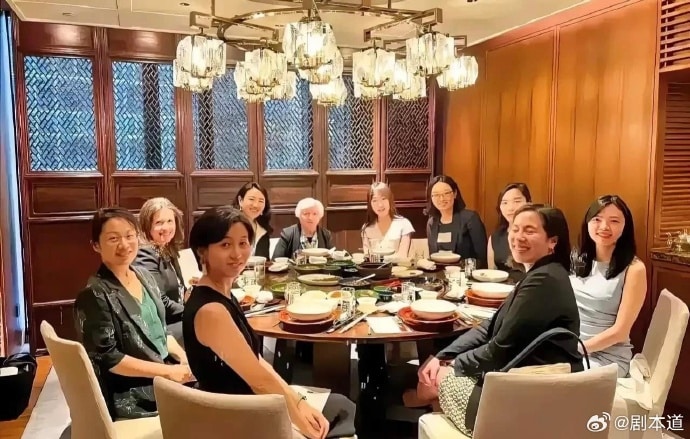
Yellen’s lunch at the Grand Hatt, image via Weibo.
● Name: ‘Made in China’ in English, Chinese name: Cháng’ān Yī Hào 长安壹号餐厅
● Specialty: Northern Chinese cuisine, including Peking duck / Fusion
● Notable: This is the venue where Yellen had lunch with a group of female economists and entrepreneurs in July of 2023 (you can see the speech she gave during lunch here). She apparently likes this restaurant a lot, since she visited it again for dinner on April 8 of this year. For her 2023 lunch, we know that Yellen ordered steamed fish head with chopped pepper (剁椒鱼头). The famous Hunan dish was among the most expensive dishes on a special menu (850 yuan/$117) for Yellen’s visit at the time. This time around, she also had Peking Duck. The award-winning Made in China restaurant, which is simply called “Chang’an no 1” in Chinese (after its address, 长安壹号餐厅), has been around for two decades, and the Beijing head chef Jin Qiang has been there from the start – he has since welcomed numerous heads of state and government leaders from around the world.
● Price: Appetizers start from 58 yuan ($8), seafood dishes around 500 yuan (69 yuan), Peking Duck 388 yuan ($53)
● Address: Grand Hyatt, Dongcheng, 1 East Chang’An Avenue / 东长安街1号东方广场
Lao Chuan Ban
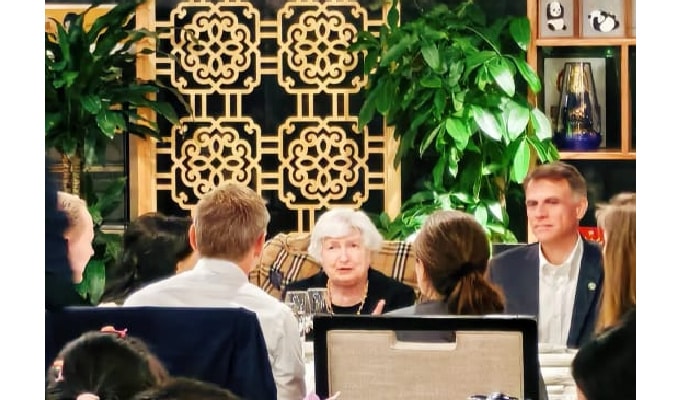
Yellen at Chuan Ban, image via Dianping.
● Name: Chuan Ban, Chinese name: 川办餐厅 aka ‘Lao Chuan Ban’ (Old Chuan Ban 老川办)
● Specialty: Sichuan food
● Notable: Chuan Ban, established as part of the Sichuan provincial government office and open to the public since 1995, is renowned for its authentic Sichuan cuisine. During her visit to Beijing, Yellen and her group dined at this famous restaurant on April 6 this year. They enjoyed a variety of dishes including Mapo tofu (麻婆豆腐), Sichuan-style cold noodles (四川凉面), clear noodles in chili sauce (川北凉粉), smashed cucumber salad (拍黃瓜), and Zhong dumpings in spicy sauce (钟水饺).
● Price:Dumplings for 18 yuan ($2.5), beef noodles for 16 yuan ($2.2), salt and pepper shrimp for 46 yuan ($6.3), fried lamb chops for 188 yuan ($26) – there’s something for everyone in different price ranges.
● Address: Dongcheng, 5 Gongyuan Toutiao, Jianguomennei Dajie / 东城区建国门内贡院头条5号
Jing-A Brewery
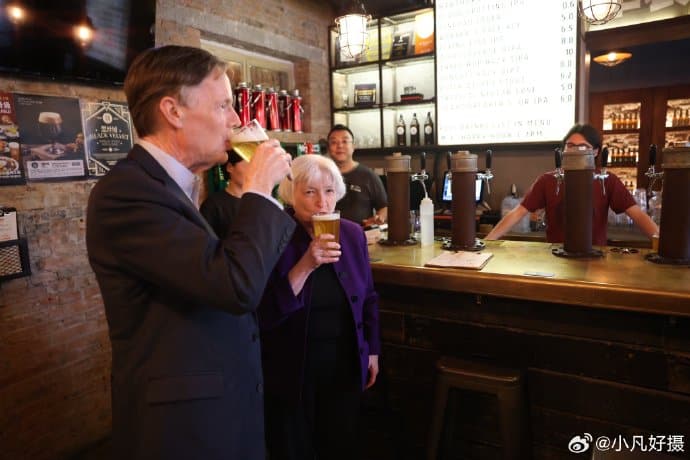
Yellen having a beer, image via Weibo.
● Name: Jing-A Brewery, Chinese name: 京A
● Specialty: Craft beer
● Notable: After five days of meetings during her 2024 China visit, Janet Yellen enjoyed a beer together with US ambassador Nicholas Burns at Jing-A, a brewery founded by wo Beijing-based American friends in 2012. In one of her tweets, Yellen explained that the microbrewery imports American hops for their beers — “a small representation of how the U.S.-China bilateral economic relationship can benefit both sides” (link).
● Price:Beers starting at 35 yuan ($4.8), snack dishes starting at 58 yuan ($8)
● Address: Jing-A Brewpub Xingfucun, Chaoyang, 57 Xingfucun Zhong Lu, Chaoyang, Beijing / 朝阳区幸福村中路57号
By Manya Koetse
Independently reporting China trends for over a decade. Like what we do? Support us and get the story behind the hashtag by subscribing:
Spotted a mistake or want to add something? Please let us know in comments below or email us. First-time commenters, please be patient – we will have to manually approve your comment before it appears.
©2024 Whatsonweibo. All rights reserved. Do not reproduce our content without permission – you can contact us at info@whatsonweibo.com.
China Media
Party Slogan, Weibo Hashtag: “The Next China Will Still Be China”
The “next China” phrase has become part of Party jargon without being clearly defined, leaving it open to various interpretations.
Published
1 month agoon
March 11, 2024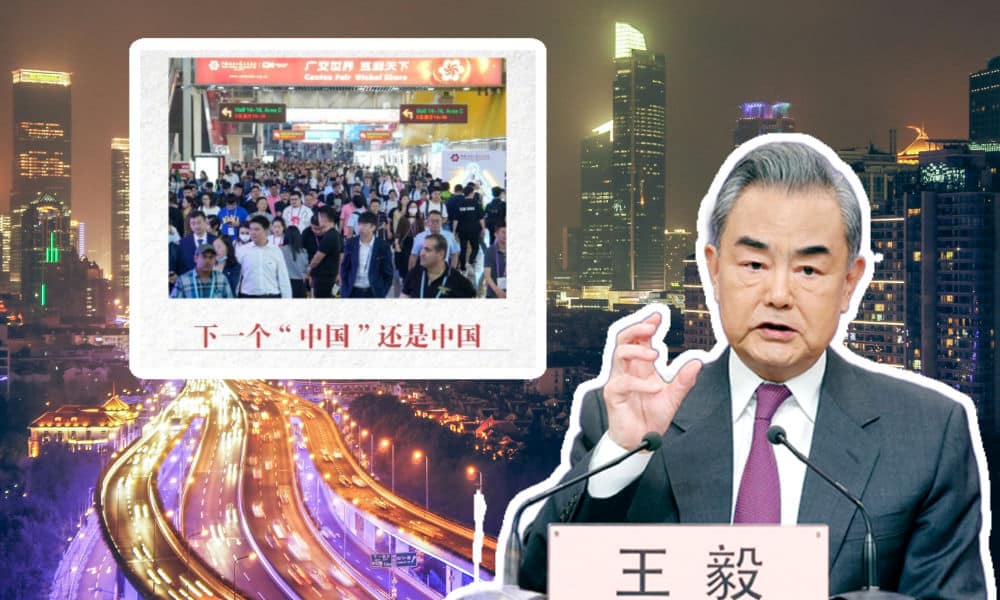
After Wang Yi’s remarks during his Two Sessions press conference, the sentence ‘the next China will still be China’ has solidified its place as a new catchphrase in the Communist Party jargon. But what does it actually mean?
Over the past week, the Two Sessions have dominated news topics on Chinese social media. On March 7, a hashtag promoted by Party newspaper People’s Daily became top trending: “Wang Yi Says the Next China Will Still Be China” (#王毅说下一个中国还是中国#).
The hashtag refers to statements made by China’s Foreign Minister, Wang Yi (王毅), also member of the Political Bureau of the Communist Party of China Central Committee, during a press conference held alongside the Second Session of the 14th National People’s Congress.
In his opening remarks to Chinese and foreign media, Wang emphasized that China’s role in a time of geopolitical unrest and shifting international relations will be one of peacekeeper, pillar, and progressor.

The Wang Yi quote is promoted by ChinaDaily on social media.
Wang’s comment about “next China” was a response to a question about China’s economic development, modernization, and diplomacy strategies. Wang replied that China remains a vital engine of growth. His comment that “the next China is still China” appeared to highlight China’s enduring importance on the world stage despite ongoing changes domestically. Wang mentioned the emergence of new industries, businesses, and increased international engagement as evidence of China’s ongoing evolution.
Wang also warned that “expressing pessimistic views about China will inevitably backfire, and misjudging China will result in missed opportunities” (“唱衰中国必将反噬自身,误判中国就将错失机遇”).
However, he did not elaborate on the specific meaning of his “next China” phrase, which is typical for Communist Party catchphrases and slogans that can often be interpreted in various ways across different contexts.
The “Next China Will Still Be China” Phrase
The phrase “the next China will still be China” has become more prominent in Chinese state media, from Xinhua to CCTV, since November 2023.
President Xi Jinping first introduced it during the San Francisco APEC Economic Leaders’ Week, stating that “China has already become synonymous with the best investment destination; the next ‘China’ is still China” (“中国已经成为最佳投资目的地的代名词,下一个‘中国’,还是中国”). The quote had previously come up in various investment and business communities.
The quote gained further traction when CCTV turned it into a hashtag on Weibo, emphasizing the message of “choosing China is choosing the future (“#下一个中国还是中国#, 选择中国就是选择未来”). It was also used by Ministry of Foreign Affairs spokesperson Wang Wenbin during one of the regular press conferences.
The slogan was also the central theme of a recent speech held by academic and China expert Martin Jacques for the state media initiated TED-like ‘China Talk’ series. Jacques’ talk, simply titled “The next ‘China’ is still China,” reflects on China’s transformation over the past 75 years from poverty to a global leading economy. Jacques emphasizes China’s unique ‘civilizational roots’ and its different approach to modernization compared to the West, which consists of nation states. He asserts that despite all the major transformations China has seen and is about to see, China’s fundamental characteristics will remain unchanged, rooted in its “civilizational template,” such as the relationship between state and society, the role of the family, and more.
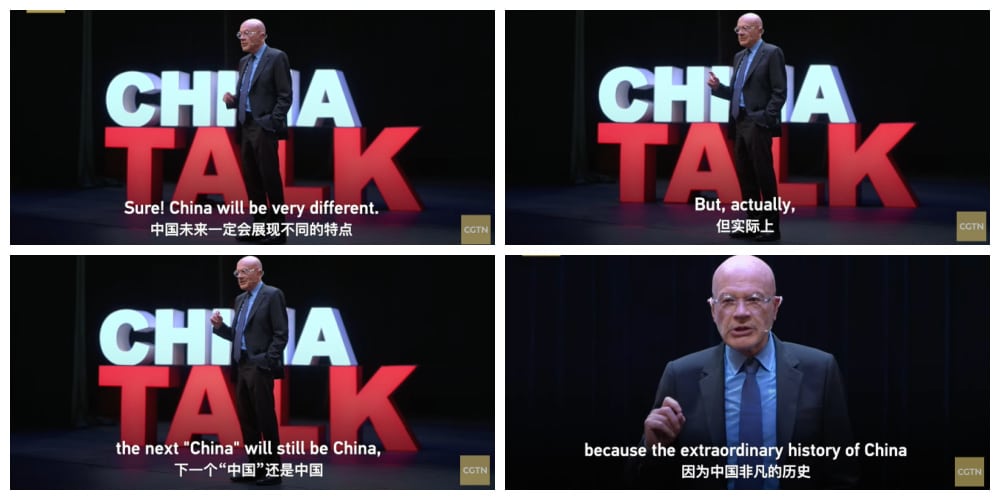
In this speech, promoted by state media over the past two weeks, “the next China is still China” signifies that despite China’s changing role in the world, its core essence, approach, and identity as a civilization remain unchanged. On Weibo, some commenters understand the sentence in a similar way, stressing that China will not betray its roots and turn into “the next America.”
However, in other contexts, the phrase is mostly used with a greater emphasis on the economy.
For instance, in Qiushi/Qs Theory, the Party’s theoretical magazine, the quote was called “an important conclusion,” highlighting “the profound capacity of China’s economy” and echoing the “general consensus of the international community.” The Qiushi publication by Shen Dan (沈丹) uses the exact same words as those employed by Wang Yi, indicating that “China remains the largest engine of global growth” (“中国仍是全球增长的最大引擎”).
While not explicitly stated, the sentence and its context serve to counter popular foreign media headlines suggesting that China’s remarkable economic development has ended and that “India is the next ‘China'” or that “Vietnam is the next ‘China’.” Instead, it suggests that China’s economic miracle will continue.
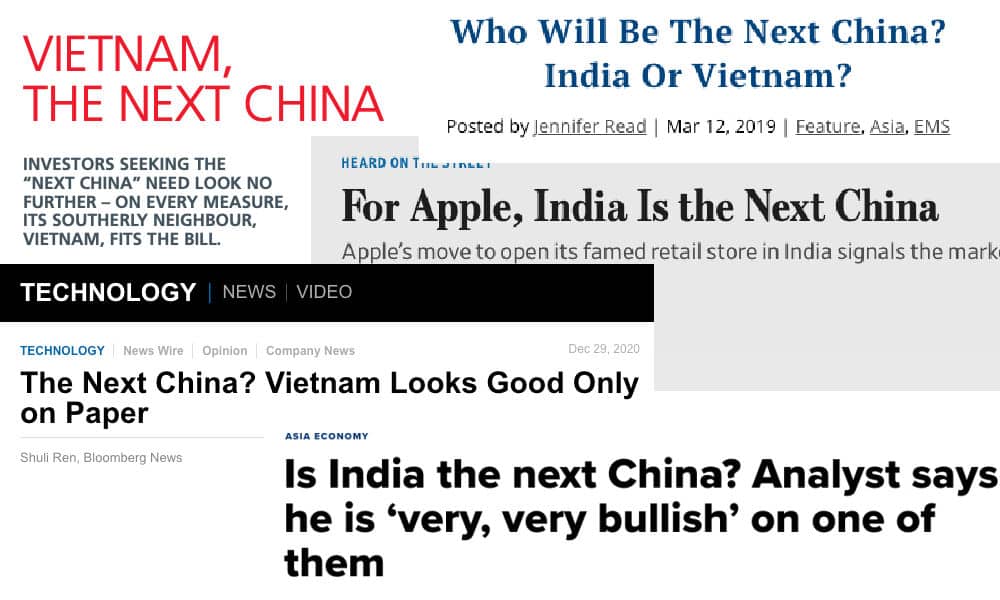
Various headlines in foreign media.
The phrase carries significant weight in the message it conveys both domestically and internationally. On one hand, it serves as a strategy to push back against negative foreign sentiment regarding China and pessimistic views on the economy. On the other hand, it sends a strong signal to Chinese consumers and businesses, encouraging confidence in the domestic economy and the future of China.
Part of Xi’s Catchphrase Canon
The “next China is still China” catchphrase stands as another slogan representing Party language and can be added to the long list of Xi Jinping’s ‘hot’ phrases (热词).
In January of this year, The Economist noted that the latest Communist Party phrases and slogans set the tone for economic campaigns and even define entire epochs of growth. They commented: “At a time when China’s leaders are attempting to drag the economy from the doldrums, there is even more reason than normal to pay attention to party-speak.”
The article describes how some phrases that come up in Xi’s speeches, especially those stressing China’s important role in the world and the country’s rapid economic growth, become part of Party jargon and are commonly used in local documents as political buzzwords. One well-known example is “Great changes unseen in a century” (“百年未有的大变局”), which entered the Party lexicon in 2017, when then-State Councillor Yang Jiechi described it as a guiding principle of Xi Jinping Thought on Diplomacy.
State media, both in Chinese and English, play a crucial role in propagating these types of popular phrases, incorporating them into various articles, videos, hashtags, and headlines.
But despite its current ubiquity and various ways to understand the “next China” slogan, not all netizens are confident that its meaning holds true. One top comment on Douyin said: “China’s birth rates have already fallen to some of the lowest globally, which doesn’t bode well for the future at all.”
However, others are more optimistic, believing that China will remain true to its essence and that its success cannot be copied thanks to the nature of Chinese people: “Hard-working, brave, energetic – that is what defines the Chinese people and that is what can never be replicated.”
By Manya Koetse
With contributions by Miranda Barnes
References
Shen Dan 沈丹. 2024. “The Next “China” Is Still China” [下一个“中国”,还是中国]. Qiushi, February 1 http://www.qstheory.cn/dukan/qs/2024-02/01/c_1130069314.htm [March 11, 2024].
The Economist. 2024. “A Guide to the Chinese Communist Party’s Economic Jargon.” The Economist, January 11 https://www.economist.com/finance-and-economics/2024/01/11/a-guide-to-the-chinese-communist-partys-economic-jargon [March 11, 2024].
Featured Image
Background photo by David Veksler on Unsplash
Get the story behind the hashtag. Subscribe to What’s on Weibo here to receive our newsletter and get access to our latest articles:
Spotted a mistake or want to add something? Please let us know in comments below or email us. First-time commenters, please be patient – we will have to manually approve your comment before it appears.
©2024 Whatsonweibo. All rights reserved. Do not reproduce our content without permission – you can contact us at info@whatsonweibo.com.
Subscribe

Weibo Watch: The Battle for the Bottom Bed

Zara Dress Goes Viral in China for Resemblance to Haidilao Apron

“Old Bull Eating Young Grass”: 86-Year-Old Chinese Painter Fan Zeng Marries 36-Year-Old Xu Meng

Chengdu Disney: The Quirkiest Hotspot in China

Where to Eat and Drink in Beijing: Yellen’s Picks

The ‘Two Sessions’ Suggestions: Six Proposals Raising Online Discussions

Top 9 Chinese Movies to Watch This Spring Festival Holiday

Party Slogan, Weibo Hashtag: “The Next China Will Still Be China”

From Pitch to Politics: About the Messy Messi Affair in Hong Kong (Updated)

Looking Back on the 2024 CMG Spring Festival Gala: Highs, Lows, and Noteworthy Moments

Two Years After MU5735 Crash: New Report Finds “Nothing Abnormal” Surrounding Deadly Nose Dive

More than Malatang: Tianshui’s Recipe for Success

In Hot Water: The Nongfu Spring Controversy Explained

The Benz Guy from Baoding and the Granny Xu Line-Cutting Controversy

Weibo Watch: Stealing the Show
Get in touch
Would you like to become a contributor, or do you have any tips or suggestions? Get in touch here!
Popular Reads
-

 China Insight2 months ago
China Insight2 months agoThe ‘Two Sessions’ Suggestions: Six Proposals Raising Online Discussions
-

 China Arts & Entertainment3 months ago
China Arts & Entertainment3 months agoTop 9 Chinese Movies to Watch This Spring Festival Holiday
-
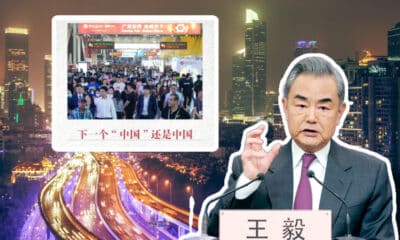
 China Media1 month ago
China Media1 month agoParty Slogan, Weibo Hashtag: “The Next China Will Still Be China”
-
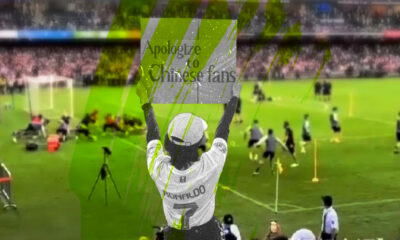
 China World2 months ago
China World2 months agoFrom Pitch to Politics: About the Messy Messi Affair in Hong Kong (Updated)

